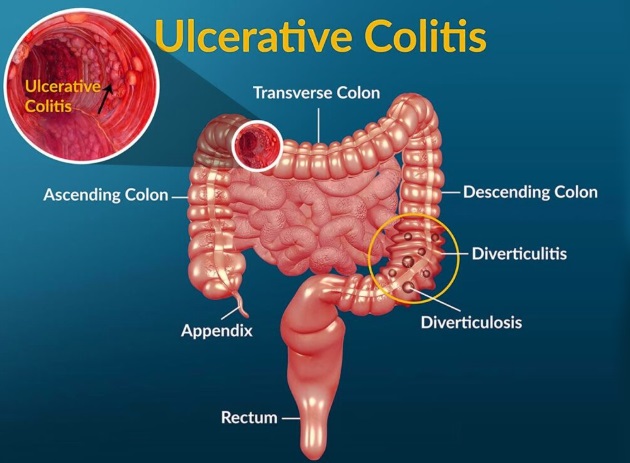Potential Benefits of Thymoquinone and Caffeic Acid in Treating Ulcerative Colitis
Nikhil Prasad Fact checked by:Thailand Medical News Team Jan 22, 2025 2 months, 3 weeks, 5 days, 18 hours, 12 minutes ago
Medical News: Researchers from Kızılcahamam State Hospital, Health Sciences University, Ankara University, and Gazi University in Turkey have explored the therapeutic effects of two natural compounds, thymoquinone (TQ) and caffeic acid phenethyl ester (CAPE), on ulcerative colitis. This condition is a chronic inflammatory disease of the colon, characterized by debilitating symptoms such as abdominal pain, diarrhea, and rectal bleeding.
 Potential Benefits of Thymoquinone and Caffeic Acid in Treating Ulcerative Colitis
Potential Benefits of Thymoquinone and Caffeic Acid in Treating Ulcerative Colitis
Thymoquinone, a phytochemical derived from the seeds of Nigella sativa (black cumin), is renowned for its antioxidant and anti-inflammatory properties. Similarly, CAPE, a component of propolis (a substance produced by bees), is recognized for its protective effects against oxidative stress and inflammation. Both compounds were investigated individually and in combination to evaluate their potential as alternative treatments for ulcerative colitis.
This
Medical News report details an experimental study conducted on rats to assess the synergistic benefits of TQ and CAPE, with promising implications for future clinical applications.
The Experimental Approach
The study involved 40 male Wistar Albino rats, divided into five groups. Each group received different treatments over five days. The treatments included saline for the control group, acetic acid to induce colitis, and combinations of TQ and CAPE to observe their therapeutic effects. The Disease Activity Index (DAI) was used to measure symptoms like weight loss, stool consistency, and rectal bleeding, providing a comprehensive overview of the inflammation levels in the colon.
Rats in the experimental groups underwent a surgical procedure to collect colon and blood samples for biochemical and histological analyses. The study focused on markers of inflammation, oxidative stress, and antioxidant activity to evaluate the efficacy of the treatments.
Key Findings of the Study
Biochemical and Oxidative Stress Markers
The results showed significant improvements in several parameters for the groups treated with TQ and CAPE:
-Reduced TNF-alpha Levels: Tumor necrosis factor-alpha (TNF-alpha), an inflammation marker, was significantly lower in rats treated with the combination of TQ and CAPE. This indicates a strong anti-inflammatory response.
-Increased Catalase Activity: Catalase, an antioxidant enzyme, was notably higher in the TQ+CAPE group, highlighting the ability of these compounds to counter oxidative damage.
-Improved Glutathione Peroxidase (GSH-Px) Levels: This enzyme, crucial for cellular defense against oxidative stress, showed higher activity in the treatment groups, particularly those receiving CAPE.
Histological Observations
The histopathological analysis revealed a mark
ed reduction in inflammation and tissue damage in the TQ and CAPE-treated groups. Notably, the combination of the two compounds provided enhanced protection against mucosal and submucosal damage compared to their individual use.
Synergistic Effects
The combination of TQ and CAPE showed a synergistic effect, outperforming individual treatments in reducing oxidative stress and enhancing antioxidant levels. This suggests that the co-administration of these compounds could provide a more robust defense against the pathological changes associated with ulcerative colitis.
Implications for Future Treatments
The findings suggest that TQ and CAPE have the potential to serve as complementary therapies for ulcerative colitis. Their ability to reduce inflammation and oxidative stress, coupled with minimal toxicity, makes them promising candidates for clinical trials. Moreover, their natural origin could appeal to patients seeking alternatives to conventional drugs.
The combination therapy demonstrated superior efficacy, providing a compelling case for its further exploration in human studies. These results underscore the importance of developing multi-targeted approaches to treat complex diseases like ulcerative colitis.
Conclusion
This study highlights the significant therapeutic potential of thymoquinone and caffeic acid phenethyl ester in managing ulcerative colitis. The findings support the hypothesis that these compounds can effectively reduce inflammation and oxidative damage, with the combination therapy showing the most pronounced benefits. Future clinical trials are essential to validate these results and determine the safety and efficacy of these treatments in humans.
The study findings were published on a preprint server and are currently being peer reviewed.
https://www.researchsquare.com/article/rs-5815391/v1
For the latest on Ulcerative Colitis, keep on logging to Thailand
Medical News.
Read Also:
https://www.thailandmedical.news/news/the-potential-of-plant-polysaccharides-for-ulcerative-colitis
https://www.thailandmedical.news/news/traditional-chinese-medicine-offers-hope-for-ulcerative-colitis-sufferers-by-targeting-micrornas
https://www.thailandmedical.news/news/herbs-and-phytochemicals-oxymatrine-from-sophora-flavescens-provides-relief-for-ulcerative-colitis
https://www.thailandmedical.news/news/melatonin-supplements-can-cause-gut-inflammation-and-increase-severity-of-crohn-s-disease-and-ulcerative-colitis-depending-on-microbiota-profile
